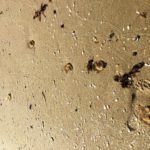Beach surveys of micro-plastics around Port Phillip Bay are providing compelling evidence of the need to rethink our use and disposal of plastic consumer goods. They also raise questions about how effective our waste management systems are at protecting marine life. A huge high 5 to Pakenham High School students who prepared the following report on what they found on June 3!
Our goal was to pick up as much rubbish as possible within a 20 minute time span over a distance of 64 metres north of St Kilda pier on the high tied line. Some of the main items that we picked up were: cigarette butts (523), nurdles (149), polystyrene beads (123), lolly pop sticks (20), plastic pieces (388), plastic bottle tops (26), lolly/food wrappers (29) and soy sauce fish or caps (10), wire, sponge, and cotton buds.
The second part of our excursion was conducted at Port Phillip EcoCentre where we sorted, counted and discussed ways to minimise the amount of plastic that travels to our oceans. The main points discussed were:
- Using reusable plastic containers for your food and drink
- Throwing your rubbish in the bin and not on the ground
- When throwing away rubbish, put it in the correct bin (So we can reuse our plastics to make other products).
Our Class of 16 and Neil Blake collected a total of 1,275 pieces of litter. Overall our classes’ average ‘search effort’ on the day was 69.2%. Our effort was compromised due to the poor weather conditions.
The long term effects of littering is becoming more toxic for our land, oceans and people. A perfect example that demonstrated this is our food chain. Plastic litter travels from the land to the drains and then into the ocean where it breaks into smaller pieces which can be mistaken for food by sea life. The small fish start off by eating the plastic, then the larger fish and then eventually we’ll end up eating our own rubbish. If we want to continue eating Seafood, we need to stop our rubbish from going into the oceans.
Some of the Year 12 VCAL students discovered the Eco Centre’s recycled garden. This helped the students develop more of an understanding about ways of reusing plastic and being more environmentally friendly. Help us, help our school, to help you with reducing plastic waste.






